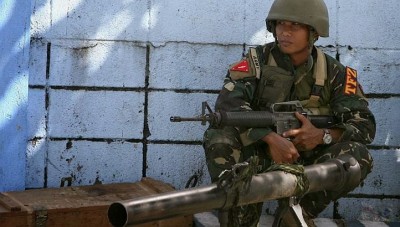Politics Over Principles: US Denies Philippines Weapons, Continues Arming Saudis

Perhaps the biggest challenge the US faces regarding its credibility globally is the self-inflicted damage it does to its alleged principles and values as a center of global power.
A perfect example of this is unfolding in the dramatic unraveling of US-Philippine relations where any and every means of finding leverage over Washington’s wayward ally is being brought to bear on Manila.
The most recent manifestation of this occurred when the US blocked the shipment of US rifles destined for the Philippines’ police forces. PhilStar Global’s article, “Duterte cancels rifle sale blocked by US over rights concerns,” would report that:
The US State Department had earlier halted the sale of about 26,000 rifles to the Philippines when US Sen. Ben Cardin said that he will oppose it due to concerns over human right violations attributed to the government’s war on drugs.
At face value, and ignoring any wider context, it would appear that the United States took a moral stand on what would have otherwise been a lucrative arms deal and would have helped draw Washington and Manila closer together politically. However, zooming out slightly from Manila, the situation in Asia Pacific finds the US being incrementally pushed out of the region as a geopolitical power broker. As nations, including the Philippines rebuff the United States and its attempts to reassert itself vis-à-vis China, Washington has resorted to leveraging human rights issues, economic pressure and even covert political and military pressure to maintain its grip on each respective nation in the region.
Putting pressure on Manila through a humiliating political stunt, not adhering to moral convictions, is the primary factor driving Washington’s decision to block its own delivery of weapons to the Philippines’ police forces.
And beyond simply identifying the true motive of America’s recent stunt, there is the matter of overt hypocrisy to account for.
Philippines Denied Rifles, Saudis Given Tanks, Warplanes and Bombs
While the US poses as morally bound to block its weapons deal with the Philippines, it continues to supply the nation of Saudi Arabia with billions of dollars of advanced weaponry, including air-delivered munitions, warplanes and main battle tanks.
In fact, according to the Guardian, in 2010 the US approved of a record weapons deal amounting to $60 billion, the largest such deal in US history. It included the delivery of additional F-15 fighters, Apache gunships and Black Hawk transport helicopters, many of the weapons now being used in armed aggression against neighboring Yemen.
The war in Yemen prosecuted by Riyadh with US and European weaponry, has become a growing humanitarian disaster with even the US and Europe’s own human rights advocacy groups forced to acknowledge the growing abuses being carried out by America and Europe’s close Arab ally.
And just this year, Reuters would report that the US Senate approved of an additional $1.15 billion arms deal with Saudi Arabia for the delivery of over 130 M1 Abram main battle tanks as well as 20 armored recovery vehicles and addition equipment to support the newly acquired systems.
Absent amid these immense weapon deals with Saudi Arabia, noted globally as a dictatorship, guilty of brutalizing its own people including through the use of public beheadings and torture, was any semblance of hesitation based on moral convictions.
Indeed, the torrent of weapons the United States supplies the Saudis, in the face of a recent block on rifle sales to the Philippines, proves the United States places politics over principles. Special interests in Washington use such principles merely as a politically-convenient prop when the opportunity presents itself, and otherwise views such principles as a surmountable obstacle to be effortlessly skipped over.
A United States guided by true convictions would be arming neither nation. A United States that sees convictions as politically convenient gimmicks, easily denies the Philippines rifles based on selective moral outrage while propping up a regime on the Arabian Peninsula that is brutalizing its people at home, prosecuting a devastating war in a neighboring nation and sponsoring terrorism worldwide. It is this lack of genuine, consistent moral principles that undermines the United States’ own self-declared status as a global leader, undermining its credibility along with the faith both Americans and foreigners alike have in the waning superpower.
Ulson Gunnar, a New York-based geopolitical analyst and writer especially for the online magazine “New Eastern Outlook”.

